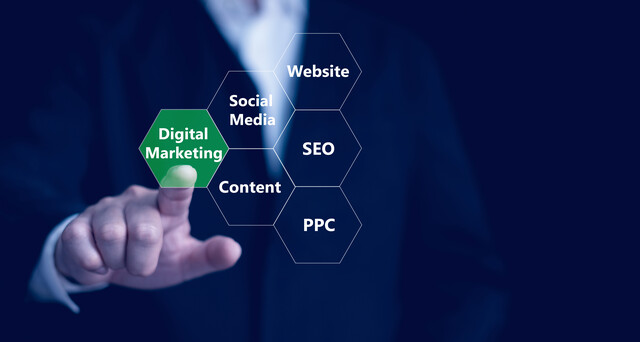Your Company's Online Niche
Medium to large companies do not necessarily think of themselves as serving niche markets. But in the world of internet marketing your company will be more successful if you can target your product or services into a particular marketplace niche. What is niche marketing? Niche marketing refers to a small segment of a larger market. Niche marketing is the basic feature of catering to that sub-set or small segment of the larger target market to help them solve a particular problem that no one else offers to solve.
When you take your company online, you will be more successful if you can carve out a specialty presentation of sorts so that you become identified as the company that does "X", whatever that may be. It seems perhaps odd in the beginning of your internet marketing efforts, but the fact is that the internet has made the world both larger and smaller at the same time. Larger in the sense that you can shop or be shopped by people half way around the world, and smaller in the sense that the more specialized you make your company's services or products the more successful you will be in cyberspace.
In the process of carving out a niche for your company, you will need to focus on what you can offer that you do not see a lot of when you Google particle products or services that your company offers. For example, when I began my company I set out to plug into the current trends toward digitization of books and services. As we developed our online presence, I came to realize that I would have to become very specialized and so I began searching for a vendor who could help me to blow out my competition. Ultimately, I wound up with two vendors � one in India and one in China; both of whom could cut my production costs to one-half of what the American vendors would charge. My company now offers some of the best prices for digitization and e-book production as well as excellent pricing for small independent authors who want to self-publish. We began to target the independent authors and people who want to be more in charge of the production of their book than they would be if they chose to turn over their manuscript to a large house. Our clients are delighted to receive professional production and they benefit by getting to keep twenty-five-plus cents on the dollar rather than ten cents on the dollar of the cover price.
That is carving out a niche for your company. Now when we started we did not see ourselves as serving the independent author, but as we became more in touch with what our industry was doing in the marketplace and particularly in the internet world, then we could see how to specialize and target our market.
- Identify your sub-markets � who are the smaller groups of people who use your services or products and how do they identify themselves? Can you identify, for example, that your services hit a range of religions and specify which ones your company serves?
- What sets each of these sub-sets apart from one another and how do their needs vary in terms of the product or services you offer?
- How can you adjust your product or services to better customize to each of the sub-set's needs? For example, if they are all different religious groups, how can you customize your product to express the variables in their religious doctrines? Does your doing so help them in a tangible way and does it make them feel better served by your efforts?
- Give them a sample and ask for feedback. When fitting your company to an online niche or sub-market, you can accomplish a lot by offering your clients or prospective clients a sample of your specialized product. Have you specialized it in such a way that helps them or better serves them? If not, how can you customize it to help them? Ask them for their feedback; they will give it.
- Do your market research. Get on the internet and find out what your niche market may be willing to pay for your specialized product or service. Can you specialize it in such a way that they will be more than happy to pay a little extra for it?
Your Company's Reputation
Your online reputation is much like your community reputation � something to work on and maintain with diligence. There is nothing to replace your reputation except another reputation or company so make sure you maintain it and pay close attention to the small things people say to you as you go about your online activities. There is a saying, "it's the little foxes that spoil the vine" and it is especially true of your online reputation.
When a client or organization is looking to engage your company in a larger contract or a significant project, they will research your reputation. I have had several clients research my company in places like Dun & Bradstreet prior to contacting me, which denotes a serious consideration since companies usually pay a fee to research using their services. Be aware that just as you need a good reputation with D&B for larger companies and government contracts, you will need to maintain a good relationship with them for online companies checking you out.
If you think about it, this only makes sense because there is no store front to go down and visit and get that "gut feeling" for the management of an online company. Anyone who researches your company in the D&B is likely looking to see if you pay your bills, so make sure you do. Make sure your company comptroller is diligent to pay the company's bills on time or ahead of time.
Another large and popular research source that clients use to find out more about you and your company is Lexis Nexis. The Lexis Nexis database also costs to research in and it is primarily known for legal information. It is in their database that clients can find out legal information on your company such as the type of business structure you have and whether your company has any past or present pending lawsuits against it. If your company has past legal actions, be aware that anyone who pays the dime can read all of the legal proceedings from that action. So, not only is it "public information" in the sense of being made available to the public through the court system, but it is also quickly accessible for a fee through systems like Lexis Nexis. Good reasons to take care of your company's public reputation so that you never find your company with an adverse record in the Lexis Nexis system.
When you start up online and before you attain a significant number of online clients it would be wise to purchase your company's reports from both D&B and Lexis Nexis. Those reports will give you a "clean copy" of your upstart information in their system. Just like your personal credit bureau, it is a good idea to purchase the reports from these two companies at least once a year to see what is in the reports. As long as you are running your company well, there is little to worry about. But, just like your personal credit report you don't want to assume all is well and have no current information on your own file.
There are smaller and less well-known organizations online that also try to provide reputation information. Be aware that they exist and take a stroll through the internet at least once a quarter to find out who the new ones are and what they provide. If they provide something unusual, then you may want to purchase it to see what it's about, but in general you will do well if you take care of your bills and stay out of the court system.
WORDS TO KNOW
- D&B � Dun and Bradstreet � The American company that keeps track of the credit worthiness of U.S. based businesses. The credit bureau of businesses.
- Lexis Nexis � A legal research source that keeps records of every corporation's legal standing, legal structure and legal actions. This is the largest and most powerful source of its kind.
- Niche marketing � To serve a niche market is to serve a sub-section of a larger market. You can remember niche easily if you think "minority" in terms of the target market; a niche is a small group within a larger group or a minority of the market that seeks a certain thing within that market.
Link Exchanges and Other Business Strategies
To successfully build out your website and your company's internet marketing you will need to implement a number of business strategies which are unique to the internet. The strategies mentioned here amount to minor endorsements or referrals so you will want to be very familiar with the people or companies which you include in them.
In the beginning, you may want to place a clear disclaimer such as: "Our company does not recommend or endorse any company listed on this page. These are listed for your shopping convenience only." As you and your company become more seasoned on the internet, you will be better prepared to take off your disclaimer in favor of the quiet, passive endorsement of people and companies listed on your site.
Link Exchanges
Link exchanges are born out of your friendly relationships with people or businesses which serve the marginal sub-sets or the fringe of your business. Sometimes you will exchange links with people or businesses who serve a common market because they serve a slightly different, but equally interesting segment. For example, my company serves Christian authors and businesses. We have link exchanges with a couple of local churches that focus on news out of Israel. In the sense that we have a common Christian audience, we have a common focus and our clients have an interest in what both our company and the churches are doing.
To keep things simple and clean for both parties, I suggest you put links in the page which take the site visitor directly to the exchange's check out so that you don't have to worry about processing the client purchases that come from each other's site traffic.
Not all businesses will be conducive to this type of an exchange. Again, you will want to exchange with businesses that do not directly compete with your company's product or niche. The page exchange works particularly well for businesses that produce certain products or services, but which do not produce other related products or services which they know their clients regularly purchase. If your clients regularly purchase related products or services, but you have chosen to keep your business out of that product or service and focused on what you produce, then your company will be successful with page exchanges.
Page Links
A page link is similar to a link exchange in that it is a link in itself, but it is usually not the main website homepage. While a link exchange links only to the main homepage, the page link can be an exchange that links to any page or product on the other party's website. This is an effective way to point your clients to your friend's site when that friend produces related services or goods that you do not produce.
Sometimes page links are set up as affiliate programs, but there is nothing to keep the individual business owner from setting up a similar exchange with business friends. In fact, if you have a business friend whose page link would greatly help your sales, you may discuss a small payment for all of the business you send them via the page link. Although among tight business associates it is considered bad taste to suggest such a payment, it is completely normal amongst business people that you barely know or know for a short period.
Referral Pages
A referral page is also known as a "related links" page or a "links of interest" page. A referral page can be set up as a query page where the visitor enters their information and you forward it to the business you are referring them to, or it can be set up as a page listing different links and services. More commonly in the internet today it is set up as the latter.
Many sites have a "Links of Interest" page which usually posts the company's logo, link and a small blurb about their products or services. You will want to make sure that the links you put on your referral page are links to reputable companies and that the products or services they offer are high quality and desired by your site visitors. As with most link exchanges, you will want these referral links to be companies that offer related products of interest to your clients rather than direct competitors to your business.
For sites or links listed on your referral page, you will want to stay in constant contact with the owner of the site or business. Once a quarter is the minimum you should be in touch with these business owners; preferably once a month. Although you will not want to post this on your site, you must make it a business policy to investigate and/or remove referral links from which you receive any complaint. Leaving them on your site if you hear of any complaint is business suicide.
WORDS TO KNOW
- Affiliate program � A marketing strategy in which a company pays individuals or companies to market their product. The affiliate is paid a percentage or more often a dollar amount per sale.
- Link exchange � Your URL to your company's homepage is posted by your friend or business acquaintance on their site and you post theirs on your site. Your link postings to each other's sites become resources to both company's clients.
- Page exchange � Your company posts a page from your friend's site inside the content of your site pointing your visitors to their product/page. Your friend's company posts your page as well.
- Page links � You post a link to your friend's product or a particular page inside of their site, not the homepage.
- Referral pages � Also known as "Links of Interest" pages; this is a page on your site in which you list the company names, logos, links and a blurb about the business for people and companies to whom you can confidently refer people.






























